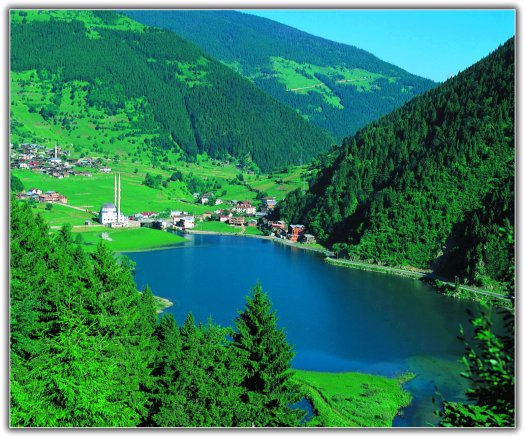
LEAP Trabzon 7th Working Committee Meetings have been held / 20-10-2010
Under the Capacity Building in the Field of Environment Project, in the scope of third component, LEAP Trabzon Working Committee Meetings have been held on 19-20 October, 2010.
Having facilitated by REC Turkey consultants Sema Alpan Atamer and Sinan Özden; Waste, Water and Wastewater, Air Pollution and Noise, and Zonning working committees came together and have been informed about the current situation of the LEAP studies. Also, action plans and verifiable indiators are estimated and discussed in the context of the Project. Next meetings will be held on 23-24 November 2010, in Trabzon.
For detailed information please visit LEAP Portal (www.yecep.org)
 Filmmakers want to do more than create works that inform and illustrate the importance of sustainability: they want to incorporate sustainable, environmentally-friendly practices into their craft. Enter the Code of Best Practices in Sustainable Filmmaking, a new guide among the first of its kind to help filmmakers assess the carbon dioxide (CO2) footprints of their productions and find ways to reduce, neutralize, and offset them. Filmmakers want to do more than create works that inform and illustrate the importance of sustainability: they want to incorporate sustainable, environmentally-friendly practices into their craft. Enter the Code of Best Practices in Sustainable Filmmaking, a new guide among the first of its kind to help filmmakers assess the carbon dioxide (CO2) footprints of their productions and find ways to reduce, neutralize, and offset them.
Please visit sustainablefilmmaking.org to read the Code of Best Practices in Sustainable Filmmaking and to learn more about its authors. As an additional resource, please see below The GreenCode for Filmmakers written by filmmaker Larry Engel.
Read more...
The Goldman Environmental Foundation has awarded the 2010 Goldman Environmental Prize to a group of six emerging leaders for their efforts in addressing some of the most pressing environmental problems affecting local communities and the planet.
This Year’s Winners
Thuli Brilliance Makama, Swaziland
Thuli Makama, Swaziland’s only public interest environmental attorney, won a landmark case to include environmental NGO representation in conservation decisions and continues to challenge the forced evictions and violence perpetrated against poverty-stricken communities living on the edges of conservation areas.
Tuy Sereivathana, Cambodia
Tuy Sereivathana worked to mitigate human elephant conflict in Cambodia by introducing innovative low-cost solutions, empowering local communities to cooperatively participate in endangered Asian elephant conservation.
Malgorzata Górska, Poland
Malgorzata Górska led the fight to protect Poland’s Rospuda Valley, one of Europe’s last true wilderness areas, from a controversial highway project that would have destroyed the region’s sensitive ecosystems.
Humberto Ríos Labrada, Cuba
A scientist and biodiversity researcher, Humberto Ríos Labrada promoted sustainable agriculture by working with farmers to increase crop diversity and develop low-input agricultural systems that greatly reduce the need for pesticide and fertilizer, encouraging Cuba’s shift from agricultural chemical dependence.
Lynn Henning, USA
Family farmer in rural Michigan, Lynn Henning exposed the egregious polluting practices of CAFOs –concentrated animal feeding operations- gaining the attention of the federal EPA and prompting state regulators to issue hundreds of citations for water quality violations.
Randall Arauz, Costa Rica
Drawing international attention to the inhumane and environmentally catastrophic shark finning industry, Randall Arauz led the campaign to halt the practice in Costa Rica, making his country the new international model for shark protection.
About the Goldman Environmental Prize
The Goldman Environmental Prize was established in 1989 by San Francisco civic leader and philanthropist Richard N. Goldman and his late wife, Rhoda H. Goldman. It has been awarded to 139 people from 79 countries. Prize winners are selected by an international jury from confidential nominations submitted by a worldwide network of environmental organizations and individuals.
Previous Prize winners have been at the center of some of the world’s most pressing environmental challenges, including seeking justice for victims of environmental disasters at Love Canal and Bhopal, India; leading the fight for dolphin-safe tuna and fighting oil drilling in the Arctic National Wildlife Refuge.
Since receiving a Goldman Prize, eight winners have been appointed or elected to national office in their countries, including several who became ministers of the environment. The 1991 Goldman Prize winner for Africa, Wangari Maathai, won the 2004 Nobel Peace Prize.
http://ecology.com/ecology-today/2010/04/22/2010-goldman-environmental-prize-winners-announced/
How to Reduce Energy Consumption, Waste, and Costs while Increasing Efficiency and ROI
Microsoft recognizes the tough challenges that data center managers, industry operators, and IT businesses face today as they struggle to support their businesses in the face of budget cuts and uncertainty about the future. It’s natural that environmental sustainability is taking a back seat in many companies at this time. But the fact is, being “lean and green” is good for both the business and the environment, and organizations that focus their attentions accordingly will see clear benefits. Reducing energy use and waste improves a company’s bottom line, and increasing the use of recycled materials is a proven way to demonstrate good corporate citizenship to your customers, employees, and the communities you do business in.
That said, it isn’t always easy to know where to begin in moving to greener and more efficient operations. With that in mind—along with Microsoft’s commitment to share best practices with the rest of the data center industry—this paper presents the top ten best business practices for environmentally sustainable data centers. The items in this list were submitted by senior members of Microsoft’s Global Foundation Services (GFS) Infrastructure Services team. Their backgrounds include expertise in server and chip development, data center electrical and mechanical engineering, power and cooling architecture and design, research and development, and business operations and administration.
Microsoft has followed the practices below for several years now and found that in addition to helping protect the environment, they lead to optimal use of resources and help teams stay aligned with core strategies and goals:
Read more...
UNITED NATIONS - NATIONS UNIES
THE SECRETARY-GENERAL
MESSAGE ON WORLD WATER DAY
22 March 2010
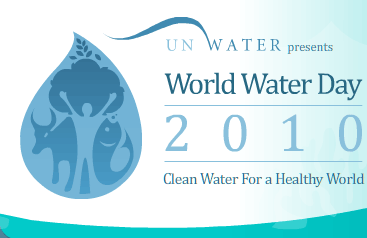 Water is the source of life and the link that binds all living beings on this planet. It is connected directly to all our United Nations goals: improved maternal and child health and life expectancy, women’s empowerment, food security, sustainable development and climate change adaptation and mitigation. Recognition of these links led to the declaration of 2005-2015 as the International Decade for Action “Water for Life”. Water is the source of life and the link that binds all living beings on this planet. It is connected directly to all our United Nations goals: improved maternal and child health and life expectancy, women’s empowerment, food security, sustainable development and climate change adaptation and mitigation. Recognition of these links led to the declaration of 2005-2015 as the International Decade for Action “Water for Life”.
Our indispensable water resources have proven themselves to be greatly resilient, but they are increasingly vulnerable and threatened. Our growing population’s need for water for food, raw materials and energy is increasingly competing with nature’s own demands for water to sustain already imperiled ecosystems and the services on which we depend. Day after day, we pour millions of tons of untreated sewage and industrial and agricultural wastes into the world’s water systems. Clean water has become scarce and will become even scarcer with the onset of climate change. And the poor continue to suffer first and most from pollution, water shortages and the lack of adequate sanitation.
The theme of this year’s World Water Day, “Clean Water for a Healthy World”, emphasizes that both the quality and the quantity of water resources are at risk. More people die from unsafe water than from all forms of violence, including war. These deaths are an affront to our common humanity, and undermine the efforts of many countries to achieve their development potential.
The world has the know-how to solve these challenges and become better stewards of our water resources. Water is central to all our development goals. As we mark the mid-point of the International Decade for Action, and look forward to this year’s MDG Summit, let us protect and sustainably manage our waters for the poor, the vulnerable and for all life on Earth.

The United Nations Environment Programme (UNEP) is coordinating the organization of the World Water Day 2010 campaign on behalf of UN-Water and in collaboration with FAO, UNDP, UNECE, UNICEF, UNESCO, UN-Habitat, WHO, and the UN-Water Decade Programme on Advocacy and Communication as well as with partner organizations such as International Water Association, World Wide Fund for Nature and World Water Council.
Asia has a diverse environment which is under growing pressure from population growth, economic development and climate change. The region now faces a number of challenges including deforestation, desertification and loss of biodiversity, meanwhile, inter-related issues, such as air and water pollution, waste management and rapid urbanisation also crowd the environment agenda.
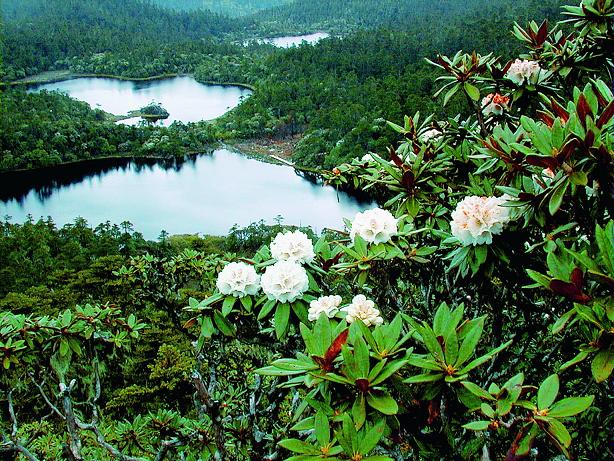
The EU is committed to helping Asia protect its environment and to finding a sustainable future for the region’s growing economies. Environmental problems are rarely contained within national borders, which is why the EU has developed an approach to deal with them at regional level.
EC programmes in the environmental field
The Commission’s Regional Strategy Paper for EU-Asia Cooperation (2007-2013) has identified the environment as a sector in need of major support. Funding of about €102 million has been allocated for the strategy’s first four years, to be spent on implementing two programmes in Asia: SWITCH Asia which focuses on sustainable consumption and production (SCP) and FLEGT Asia which promotes sustainable forest management.
Read more...
National Wildlife Federation Releases New Report - November 2009
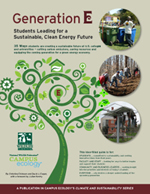 Students Leading for a Sustainable, Clean Energy Future Students Leading for a Sustainable, Clean Energy Future
By Christina Erickson and David J. Eagan, with a foreword by Julian Keniry
35 ways students are creating a sustainable future at U.S. colleges and universities - cutting carbon emissions, saving resources and equipping the coming generation for a green energy economy.
This 70 page, example-rich guide is a timely, best-practices report on exemplary student-led sustainability activities and programs at schools around the U.S. Like other guides in the NWF Campus Ecology Climate and Sustainability Series, it features dozens of examples from postsecondary institutions of all types; public and private, urban and rural, large and small. More than 160 campuses from 46 states plus the District of Columbia are included, along with photos, graphics, links to related resources and an extensive endnotes section so readers can learn more about specific campus projects. As an illustrated “idea-book,” it shows students, faculty and staff a wide range of project possibilities, encouraging them to engage with their campus and community in ways that make real reductions in their school's carbon footprint and also foster the technical and intellectual skills needed in the future green economy.
Read more...
 Italian officials warned of an ecological disaster as they scrambled to contain an oil spill that reached the the Po river yesterday. Italian officials warned of an ecological disaster as they scrambled to contain an oil spill that reached the the Po river yesterday.
Milan regional officials said the cause was certainly sabotage at a former refinery turned oil depot on the tributary Lambro river. While no arrests have been made, Italian news reports have noted that the depot owner had laid off several workers in recent months.
There were varying accounts of the amount of oil released: officials in Milan said they now believed 2.5 million litres had poured out, but environmental groups put the quantity at 600,000 litres.
The WWF wildlife charity said several water and bird species were at risk from the spill, with fish, wild ducks and herons – that were beginning to nest along the Po – the most at risk. Several oil-covered ducks have already been plucked from the river and taken for treatment at a regional animal shelter.
But even after the spill is cleaned up the impact will last, the WWF said, as the Po river valley is the most important agricultural region in Italy, and the Po is used extensively for irrigation, environmentalists noted. The spill began on Tuesday at the depot near Monza and spread south down the Lambro to Piacenza and Cremona overnight, despite efforts to contain it. By yesterday, it had reached the Po, which crosses the country from Piedmont in the west, across Turin and Ferrara, before emptying into the Adriatic.
"The scale of this is dramatic," said Damiano di Simine, regional president of the Legambiente environmental group. He said his organisation – as well as the regional government – had asked that a state of emergency be declared to release federal funds to help contain it.
The Lombard regional president, Roberto Formigoni, said those responsible would be prosecuted and punished severely for the "ecological disaster". "Some criminal decided to intervene in a harmful and cowardly way, putting at risk an asset that belongs to all of us," he was quoted as saying by the Apcom news agency.
http://www.independent.co.uk/news/world/europe/italys-longest-river-at-risk-after-sabotage-at-oil-depot-1909934.html
 The whole of the world's instrumental temperature record – millions of observations dating back more than 150 years – is to be re-analysed in an attempt to remove doubts about the reality of global warming. The whole of the world's instrumental temperature record – millions of observations dating back more than 150 years – is to be re-analysed in an attempt to remove doubts about the reality of global warming.
The new analysis, an enormous task which will be carried out by several groups of scientists working independently in different countries, has been proposed by the UK Met Office in the wake of recent controversies over climate science, such as the "climategate" email affair at the University of East Anglia and revelations that the last report of the Intergovernmental Panel on Climate Change (IPCC) contained inaccuracies and exaggerations.
The whole of the world's instrumental temperature record – millions of observations dating back more than 150 years – is to be re-analysed in an attempt to remove doubts about the reality of global warming.
The new analysis, an enormous task which will be carried out by several groups of scientists working independently in different countries, has been proposed by the UK Met Office in the wake of recent controversies over climate science, such as the "climategate" email affair at the University of East Anglia and revelations that the last report of the Intergovernmental Panel on Climate Change (IPCC) contained inaccuracies and exaggerations.
The proposal was put to the World Meteorological Organisation by the Met Office at a meeting in Antalya, Turkey, earlier this week, and accepted by 150 delegates from around the world. Its detailed terms will be agreed at a conference to be held in Britain later this year.
Read more...
|
|



 Environment News
Environment News


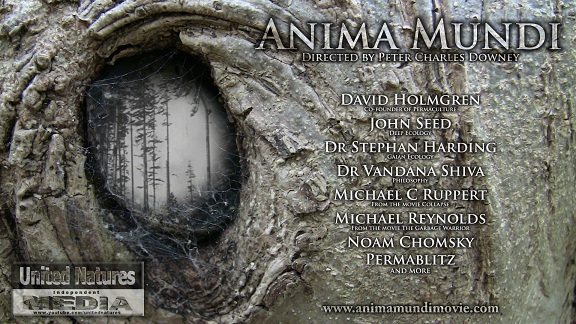

 Filmmakers want to do more than create works that inform and illustrate the importance of sustainability: they want to incorporate sustainable, environmentally-friendly practices into their craft. Enter the Code of Best Practices in Sustainable Filmmaking, a new guide among the first of its kind to help filmmakers assess the carbon dioxide (CO2) footprints of their productions and find ways to reduce, neutralize, and offset them.
Filmmakers want to do more than create works that inform and illustrate the importance of sustainability: they want to incorporate sustainable, environmentally-friendly practices into their craft. Enter the Code of Best Practices in Sustainable Filmmaking, a new guide among the first of its kind to help filmmakers assess the carbon dioxide (CO2) footprints of their productions and find ways to reduce, neutralize, and offset them. Water is the source of life and the link that binds all living beings on this planet. It is connected directly to all our United Nations goals: improved maternal and child health and life expectancy, women’s empowerment, food security, sustainable development and climate change adaptation and mitigation. Recognition of these links led to the declaration of 2005-2015 as the International Decade for Action “Water for Life”.
Water is the source of life and the link that binds all living beings on this planet. It is connected directly to all our United Nations goals: improved maternal and child health and life expectancy, women’s empowerment, food security, sustainable development and climate change adaptation and mitigation. Recognition of these links led to the declaration of 2005-2015 as the International Decade for Action “Water for Life”.

 Students Leading for a Sustainable, Clean Energy Future
Students Leading for a Sustainable, Clean Energy Future The whole of the world's instrumental temperature record – millions of observations dating back more than 150 years – is to be re-analysed in an attempt to remove doubts about the reality of global warming.
The whole of the world's instrumental temperature record – millions of observations dating back more than 150 years – is to be re-analysed in an attempt to remove doubts about the reality of global warming. 

